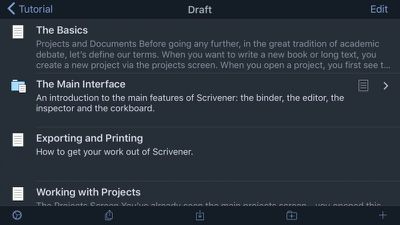Popular writing suite Scrivener received its first major update for iOS today. Version 1.1 includes a number of enhancements under the hood, but the most obvious requested feature is a new Dark Mode.
The new Dark Mode can be enabled from within an open project by tapping the gear icon in the footer of the sidebar. This opens Project Settings, where users will see a toggle option for the new theme. All elements of Scrivener will switch to the Dark Mode, which should be useful for writers who often work in low light environments.

Elsewhere in version 1.1, the custom icons set now allows users to select emojis as document icons. To access the emojis, bring up the inspector icon for any binder document and press on the icon option. Along with the list of existing markers to choose from, users will notice a custom field where they can type any letter (or combination to associate a character point-of-view), or an emoji into that field.
In addition to bug fixes, the Scrivener team has updated the API used by Dropbox. Dropbox is moving to a new API at the end of June 2017, so the underlying sync code has been revised to make it ready for the transition.
Scrivener for iOS costs $19.99 and is available to download for iPhone and iPad on the App Store. [Direct Link]























Top Rated Comments
Why do you think the reason behind it has been nullified? I'd love to provide iCloud support (I'm the developer), but unfortunately iCloud just isn't compatible with Scrivener's file format (or Scrivener isn't compatible with iCloud if you prefer to put it that way). The problem is that Scrivener is a bit of a hybrid between a shoebox and a document-based app. So, each project is really a folder full of files. iCloud supports that to an extent, but not in the way Scrivener requires. When you open a project in Scrivener, not all of the project is loaded into memory - only the bits of the project (the documents in it) that you open at any one time. It works like this so that the memory footprint is low even for enormous projects and so that you can import massive amounts of research.
And that's the problem. Because a project is never fully open in memory, but only the parts currently in use, you could end up with a horribly corrupted project if parts of it synced in the background while other parts were open. Projects would become unusable. For instance, suppose Scrivener started to sync automatically but then lost its internet connection; it would have to tell you that you couldn't use the project until you found an internet connection and it was able to continue syncing. So it needs complete control over sync (thus an "archaic" manual sync), and iCloud doesn't allow for this. Of course, if you are only working on one device at a time and you have a constant internet connection on all devices, the potential for such problems is low. But I have to consider situations where a project has been edited on several devices with intermittent internet connections and the chaos that could cause if I had no control over which files in the project were uploaded or downloaded and when.
I have spoken to Apple about this, using their developer tech support system to look for some solution to implementing iCloud, but their suggestion was that Scrivener would need to download separate copies of your files to a separate, temporary container (doubling the space required for each project) and to move them into place when safe (still using a manual sync). So it would offer no benefits over Dropbox sync and would (temporarily) take up twice as much space.
(I know you mention iCloud Drive support rather than iCloud per se, but all of what I say here applies on the iOS end of things.)
iCloud is wonderful, but it works best with "flat" file formats, with individual files, or with package-based file formats that are opened in memory all in one go, and as yet there is, unfortunately, no magic solution for getting iCloud to work with Scrivener. I understand that Scrivener is unusual in this regard, and that some users find this an annoying limitation, but I'd pretty much have to rip out Scrivener's core features to implement iCloud support the way things stand. And I'd rather users complain about a lack of iCloud support than about losing data. :) That said, I am always watching developments in iCloud and would genuinely love to find a solution in the future.
All the best,
Keith
P.S. Many thanks to Tim for mentioning our 1.1 update on MacRumors!
P.P.S. If there's an experienced iCloud developer reading this who thinks I am speaking nonsense, please get in touch! :)
Looking forward to the release of Scrivener 3 for macOS. Will be buying it on release day.
There are times I prefer to travel with the iPad and use it to write over my MBP.
Scrivener and Final Draft are 90% of what I do, and on the iPad, I'm soaring.
It's a bit ridiculous they're still holding back on this, given their reasoning behind it now seems nullified.